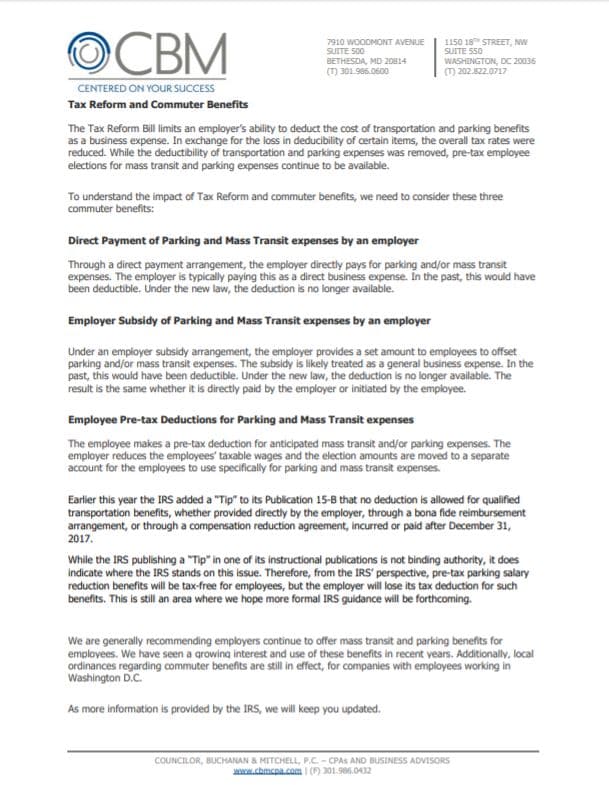
The Tax Reform Bill limits an employer’s ability to deduct the cost of transportation and parking benefits
as a business expense. In exchange for the loss in deductibility of certain items, the overall tax rates were
reduced. While the deductibility of transportation and parking expenses was removed, pre-tax employee
elections for mass transit and parking expenses continue to be available.
To understand the impact of tax reform and commuter benefits, we need to consider these three
commuter benefits:
Direct Payment of Parking and Mass Transit Expenses by an Employer
Through a direct payment arrangement, the employer directly pays for parking and/or mass transit
expenses. The employer is typically paying this as a direct business expense. In the past, this would have
been deductible. Under the new law, the deduction is no longer available.
Employer Subsidy of Parking and Mass Transit Expenses
Under an employer subsidy arrangement, the employer provides a set amount to employees to offset parking and/or mass transit expenses. The subsidy is likely treated as a general business expense. In the past, this would have been deductible. Under the new law, the deduction is no longer available. The result is the same whether it is directly paid by the employer or initiated by the employee.
Employee Pre-tax Deductions for Parking and Mass Transit Expenses
The employee makes a pre-tax deduction for anticipated mass transit and/or parking expenses. The employer reduces the employees’ taxable wages and the election amounts are moved to a separate account for the employees to use specifically for parking and mass transit expenses.
Earlier this year the IRS added a “Tip” to its Publication 15-B that no deduction is allowed for qualified transportation benefits, whether provided directly by the employer, through a bona fide reimbursement arrangement, or through a compensation reduction agreement, incurred or paid after December 31, 2017.
While the IRS publishing a “Tip” in one of its instructional publications is not binding authority, it does
indicate where the IRS stands on this issue. Therefore, from the IRS’ perspective, pre-tax parking salary
reduction benefits will be tax-free for employees, but the employer will lose its tax deduction for such
benefits. This is still an area where we hope more formal IRS guidance will be forthcoming.
We are generally recommending employers continue to offer mass transit and parking benefits for
employees. We have seen a growing interest and use of these benefits in recent years. Additionally, local
ordinances regarding commuter benefits are still in effect, for companies with employees working in
Washington D.C.
As more information is provided by the IRS, we will keep you updated.
Councilor, Buchanan & Mitchell (CBM) is a professional services firm delivering tax, accounting and business advisory expertise throughout the Mid-Atlantic region from offices in Bethesda, MD and Washington, DC.




